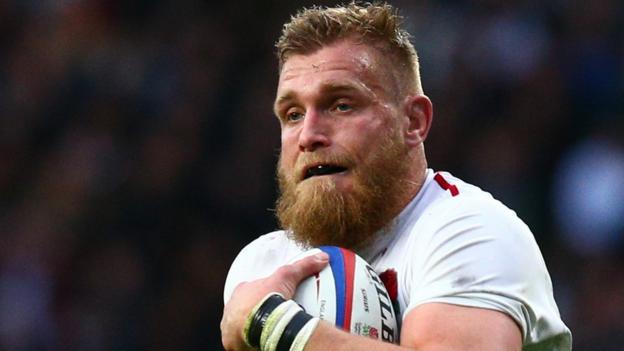
England flanker Brad Shields will be out for up to six weeks, meaning he may not play again before the squad depart for the World Cup in Japan.
The Wasps forward, 28, returned home early from a training camp in Italy last week after injuring a foot.
He now faces a race to prove his fitness before England's World Cup opener against Tonga on 22 September.
"Brad has got a tear in the lower foot," said assistant coach John Mitchell.
"It's always a little bit niggly - and it's four to six weeks for him - but we will continue to appraise his recovery and see where he gets to."
Head coach Eddie Jones will name his 31-man World Cup squad on 12 August - the day after England's first warm-up match against Wales at Twickenham.
Jones' side then face Wales in Cardiff, with games against Ireland and Italy completing their preparations.
With experienced former captain Chris Robshaw omitted, a fully fit Shields would appear to be a near certainty for selection.
"Obviously we have got a deadline, and that is important," said Mitchell. "But there is plenty of time to go."
Defence coach Mitchell, meanwhile, played down concerns about the fitness of winger Jack Nowell, who flew back from Italy for a medical assessment on his ankle problem.
But he said he had "no idea" when the Exeter back would be available for selection, with a "clearer view" expected "once he is out of his surgical review".
"Jack is going really well," said Mitchell, who added Nowell's return home was "in his programme" and "happens with all surgical situations".
Mitchell also said lock George Kruis was back training after his ankle operation, with England running drills this week against Italy's national side in extreme humidity in Treviso.
"The heat isn't so bad, but the variance in the humidity means it takes a while to adapt," he said. "We have had some humidity ranging between 75 and 90% which makes you sweat.
"Italy were in on Monday, which was invaluable. It is always nice at some point in your preparation to train against an organised opposition you are not familiar with on a day-by-day basis."
Mitchell said there were strict parameters in place to avoid a repeat of England's training session against Georgia earlier in the year, when brawls erupted between the two sets of forwards.
"There were rules around the contact constraints, so there was no bone on bone or live contact," he said.
"It was really constructive and unemotional, which often isn't the case when forwards are up against forwards. Both countries got a lot out of it."















 Phone: (800) 737. 6040
Phone: (800) 737. 6040 Fax: (800) 825 5558
Fax: (800) 825 5558 Website:
Website:  Email:
Email: 






